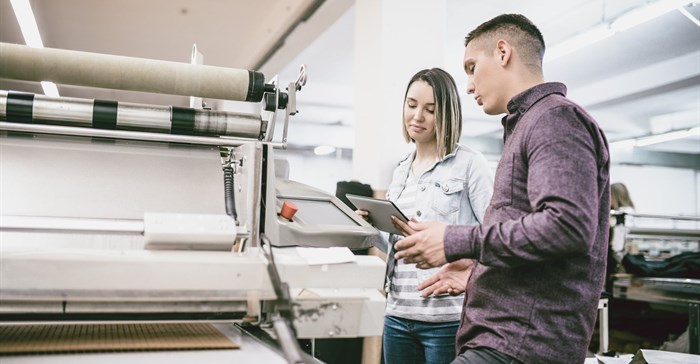
The answer is in the ability of an industry to tap into the opportunity presented by the 4IR.
We can no longer speak about change that is coming; transformation of industries is already happening. If we want to be part of the change, then we must start changing the way we see ourselves. As printers, we are part of SA’s manufacturing industry. This means we must act on the opportunity presented by the 4IR to continue contributing to our country’s economic growth.
There is consensus that the 4IR will provide the economic growth necessary to move the country forward.
The South African printing sector currently contributes about 2% to the country’s gross domestic product (GDP) and combined with the packaging industry, is estimated to be worth R56bn. It directly employs 45,000 people, and indirectly, a further 60,000 people. The printing sector complements the country’s manufacturing industry, which is the fourth largest industry, contributing 14% to SA’s GDP.
Furthermore, according to the World Economic Forum, the value of digital transformation in the 4IR is estimated to be $100 trillion in the next 10 years, across all sectors, industries and geographies. The manufacturing sector, which has long been a driver of global prosperity and economic growth, is key to this transformation.
A highly skilled workforce is one of the ways that the manufacturing and printing industry can prepare for the 4IR. Thoughts must be given as to tomorrow’s employee and how we prepare them for the future.
Investment in technology is a non-negotiable for those who want to seize the opportunities presented by the 4IR.
Processes and systems that enable companies to improve efficiencies and delivery through digital transformation, will result in long-term cost savings, faster turnaround times and ultimately better service, enhanced output and value for customers.
Novus Holdings has invested close to R4bn since 2000 to ensure that its facilities are equipped with modern technology. This enables the business to successfully tender for large projects with tight deadlines and complex operating requirements nationally. Its technologically advanced equipment follows international best practice, ensuring a fully automated production process.
But making such investments must be aligned to the business’s overall strategy, in the context of the 4IR.
To us, this means being able to identify niche printing markets and service them accordingly. While there is adequate evidence to suggest that the printing industry will continue to exist, it won’t be in its current form. By changing how we see ourselves and harnessing the evolving environment presented by the 4IR, we can unlock more value for customers, and, in so doing, futureproof the continued economic prosperity of the printing and manufacturing industries.
